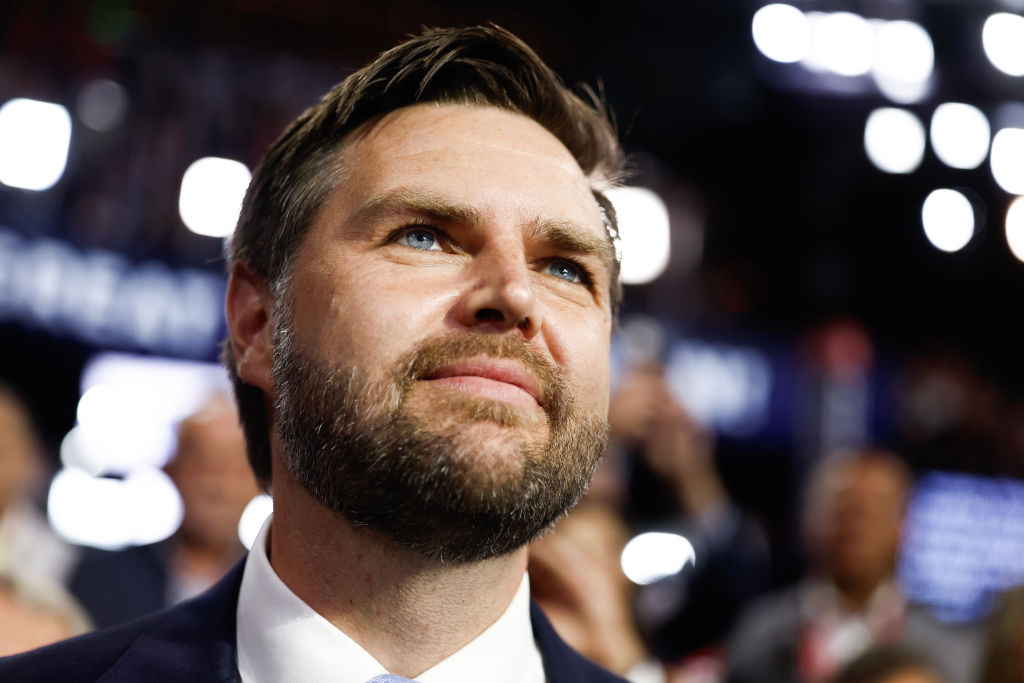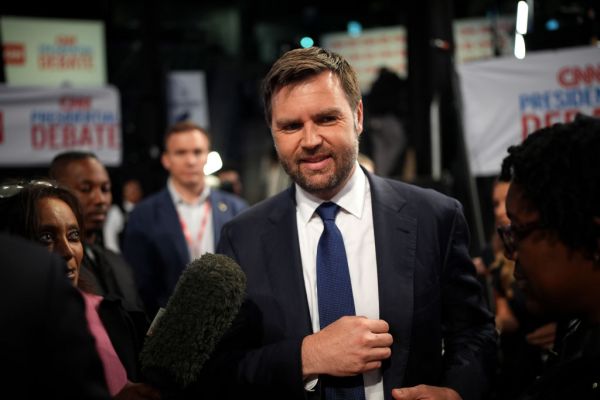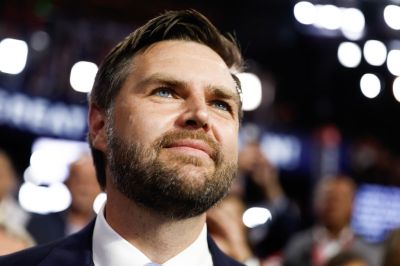Happy Tuesday! We once wrote to you that Robert F. Kennedy Jr. delivered the third-best response a person running for president can give when asked if he’d spent time on Jeffrey Epstein’s private jet—that is, that RFK was on Epstein’s plane not zero times or one time, but two times.
He continued in that tradition this week, when asked whether more women would come forward with sexual assault allegations against him: “I don’t know,” he told the Boston Globe. “We’ll see what happens.”
Quick Hits: Today’s Top Stories
- Politicians across the political spectrum seem concerned about exacerbating negative political rhetoric following the assassination attempt against former President Donald Trump. In an interview with NBC News’ Lester Holt on Monday evening, President Joe Biden said he regrets comments he made last week on a private call with donors when he referred to putting Trump in a “bullseye,” saying it was “a mistake to use the word.” While the Biden campaign also temporarily paused political advertising, the president did defend calling Trump a “threat to democracy,” asking, “Do you just not say anything because it may incite somebody?” Meanwhile, Republican Senate candidate Dave McCormick of Pennsylvania proposed that both he and his opponent, Democratic Sen. Bob Casey Jr., suspended all negative advertisements as a demonstration of unity. A spokesperson for Casey said the campaign had already reached out to TV stations on Saturday night to temporarily pause advertising.
- Secretary of Homeland Security Alejandro Mayorkas—head of the department that oversees the Secret Service—said Monday that Donald Trump’s attempted assassination was a “failure” of security. “When I say that something like this cannot happen, we are speaking of a failure,” Mayorkas said on CNN. “We are going to analyze, through an independent review, how that occurred, why it occurred, and make recommendations and findings to make sure it doesn’t happen again.” Secret Service Director Kimberly Cheatle also said Monday that she is confident in Trump’s security plans for this week’s Republican National Convention in Milwaukee. She also announced changes to the former president’s security detail “to ensure his continued protection for the convention and the remainder of the campaign.” Mayorkas also announced Monday that, after months of rebuffing such calls, the president had directed him to provide Secret Service protection to Robert F. Kennedy Jr. “in light of this weekend’s events.”
- The FBI on Monday provided an update on its investigation. In addition to announcing that it gained access to the shooter’s smartphone, the FBI also said it completed searches of the shooter’s home and vehicle, where it found “suspicious devices” currently being evaluated but “rendered safe” by bomb technical specialists. The investigative agency also confirmed that they are still exploring the possibility of co-conspirators, though evidence thus far suggests the gunman acted alone. A local Pennsylvania news station reported Monday that local law enforcement saw the shooter on the roof 30 minutes before he opened fire but failed to apprehend him.
- Trump announced on Monday—the first day of the Republican National Convention—that he had selected Sen. J.D. Vance of Ohio as his running mate. Although the author of New York Times bestseller Hillbilly Elegy was a sharp critic of Trump during the 2016 election campaign, Vance has in recent years become a strident defender of the president, economic populism and protectionism, and isolationist foreign policy. “J.D. has had a very successful business career in Technology and Finance, and now, during the Campaign, will be strongly focused on the people he fought so brilliantly for, the American Workers and Farmers in Pennsylvania, Michigan, Wisconsin, Ohio, Minnesota, and far beyond,” Trump said in his Truth Social announcement.
- Judge Aileen Cannon—the federal district judge overseeing special counsel Jack Smith’s case against former President Donald Trump for his alleged mishandling of classified documents—dismissed federal charges against Trump in the case Monday, ruling that Smith was unlawfully appointed as special counsel. While this does not spell the definite end for Trump’s classified documents case—Smith can appeal Cannon’s ruling or the Justice Department can refile the case with a new lead prosecutor—it all but ensures the case will not go to trial before the November election. “The Court has difficulty seeing how a remedy short of dismissal would cure this substantial separation-of-powers violation,” Judge Cannon wrote in her 93-page opinion. “Congress is empowered to decide if it wishes to vest appointment power in a Head of Department, and indeed, Congress has proven itself quite capable of doing so. ... But it plainly did not do so here.”
- Multiple wildfires in southern California have burned more than 30,000 acres of land in recent days, forcing 1,000 people to evacuate their homes and briefly closing Interstate 5 over the weekend. According to a statement by the National Weather Service, the fires, which are primarily concentrated in Kern and San Luis Obispo counties, were started by dry lightning strikes in areas with critical fire conditions.
- Members of the terrorist group Al-Shabaab detonated a car bomb in Mogadishu, Somalia, on Sunday night, killing at least five and injuring 20. The explosion occurred at a watch party for the Euro 2024 final near Villa Somalia—the official residence of the nation’s president—with Al-Shabaab claiming to have targeted a meeting place for Somali security and government officials. The bombing is the latest in a string of attacks by Al-Shabaab, a part of the broader Al-Qaeda terrorist organization, on Somalia’s capital. Somali security forces are currently waging a counteroffensive against the terror group, which controls a substantial amount of territory in the country.
- Los Angeles Dodgers outfielder Teoscar Hernández won Major League Baseball’s annual Home Run Derby on Monday, hitting 49 total home runs to outlast Kansas City Royals shortstop Bobby Witt Jr. in the final round of the contest.
J.D. Vance Gets the Nod

Editor’s Note: Our Dispatch Politics colleagues are on the ground in Milwaukee this week to cover the Republican National Convention. We’ll be including some of their reporting and analysis in TMD over the next few days, but you can—and should—subscribe to Dispatch Politics to get more of their in-depth reporting on this crucial political moment right to your inbox.
MILWAUKEE—Donald Trump has selected Sen. J.D. Vance as his running mate, setting up the freshman Republican from Ohio as the future of the party and Trump’s MAGA movement.
“After lengthy deliberation and thought, and considering the tremendous talents of many others, I have decided that the person best suited to assume the position of Vice President of the United States is Senator J.D. Vance of the Great State of Ohio,” Trump posted Monday afternoon on Truth Social, his social media network.
Within an hour of that announcement, Vance was formally nominated by the Republican National Convention. As he walked onto the floor of the Fiserv Forum with Merle Haggard’s “America First” playing over the speakers, the 39-year-old first-term senator and his wife Usha stood with the Ohio delegation for the vote. The convention voted by acclamation to give Vance the nomination; when the presiding RNC member, Iowa Attorney General Brenna Bird, quickly asked for “nay” votes, there were no audible objections.
As our own John McCormack reported in a profile of Vance on the site last week, the unanimous display of approval at the convention is much different than the reception he might have received in 2016. Back then, he was a media darling; the bestselling author of a memoir, Hillbilly Elegy, about his hardscrabble life in rural Appalachia; the arch-Trump critic from Trump country. Vance called the former president “cultural heroin” in the pages of The Atlantic, “America’s Hitler” in a text to a friend, and wondered in a since-deleted tweet, “What percentage of the American population has @RealDonaldTrump sexually assaulted?”
The intervening years have seen the populist try to rehab his image with the MAGA crowd. “I ask folks not to judge me based on what I said in 2016, because I’ve been very open that I did say those critical things and I regret them, and I regret being wrong about the guy,” he told Fox News in 2021 during his senatorial run in a crowded Republican primary field. He ultimately won that race with the former president’s endorsement, and the general election six months later—though he dramatically underperformed other Republicans on the ballot in Ohio.
On Monday night, Vance once again faced his past head-on, positioning himself as a zealous convert who’d previously been duped. “I bought into the media’s lies and distortions, I bought into the idea that somehow he was going to be so different, a terrible threat to democracy,” he told Fox News’ Sean Hannity after the TV anchor rattled off a list of Vance’s sins against the former president. “It was a joke.”
Attendees seem to have accepted his apology. “I think he’s going to be a great surrogate for Donald John Trump,” said Ruth Streck, an alternative delegate from Wisconsin. “He’s perfectly human, and that resonates.”
Rep. Cory Mills of Florida told Dispatch Politics that Vance’s blue-collar background provides a balanced worldview to the ticket. “Coming from a different perspective and life than what the president has is a real benefit to represent more of the community that we represent as America,” Mills said.
At this point, though, it’s safe to say that the blue collar is buried deep in his background. After he graduated from high school, Vance enlisted in the Marines. From there, he graduated from Ohio State in just two years before stints at Yale Law School, a D.C. law firm, Silicon Valley venture capitalism, and the U.S. Senate. In office for just two years, Vance is still a relative political neophyte—and he’s now running to be a second-in-line to the presidency, with a near-octogenarian at the top of the ticket.
A person familiar with Vance’s selection told Dispatch Politics the senator received the offer from Trump just 20 minutes before the Republican nominee announced his choice publicly. The pick followed a series of reports early Monday afternoon that others in contention, including Sen. Marco Rubio of Florida and North Dakota Gov. Doug Burgum, had been told they had not been selected.
Trump’s choice of Vance stands in stark contrast to his professed desire to dial back heated political rhetoric and promote unity in the wake of the attempt on his life over the weekend. Following that Saturday shooting in Butler, Pennsylvania, Vance tweeted that the assassination attempt was “not just some isolated incident.”
“The central premise of the Biden campaign is that President Donald Trump is an authoritarian fascist who must be stopped at all costs,” Vance wrote. “That rhetoric led directly to President Trump’s attempted assassination.”
And Vance’s unanimous nomination at the convention belies just how divisive a pick Vance is—and the sea change moment he represents for the definition of Republican orthodoxy. Though he’s flip-flopped on support for Trump, Vance has had a fairly consistent populist bent that has only grown more pronounced in the last few years. On economic policy, he favors protectionism and tariffs—particularly on goods from China. He’s also praised the aggressive antitrust actions of Federal Trade Commission Chair Lina Khan—appointed by President Joe Biden. “I look at Lina Khan as one of the few people in the Biden administration that I think is doing a pretty good job,” he said in March. In an interview with Ross Douthat of the New York Times last month, he said, “The people on the left, I would say, whose politics I’m open to—it’s the Bernie Bros.”
“But generally,” Vance continued in that interview, “center-left liberals who are doing very well, and center-right conservatives who are doing very well, have an incredible blind spot about how much their success is built on a system that is not serving people who they should be serving.”
Vance is also a proponent of isolationist foreign policy, a far cry from the “peace-through-strength” Reaganism that used to dominate the GOP’s agenda. He’s been particularly critical of aid to Ukraine. “I think it’s ridiculous that we’re focused on this border in Ukraine,” he said on Steve Bannon’s “War Room” podcast in February 2022. “I’ve got to be honest with you, I don’t really care what happens to Ukraine one way or the other.”
Though Vance is skeptical of the transatlantic alliance, he breaks from his isolationism when it comes to Israel. “A big part of the reason why Americans care about Israel is because we are still the largest Christian-majority country in the world, which means that a majority of citizens of this country think that their Savior—and I count myself a Christian—was born and died and resurrected in that narrow little strip of territory on the Mediterranean,” Vance said during a May speech at the Quincy Institute, a D.C. think tank that favors a restrained U.S. foreign policy. “The idea that there is ever going to be an American foreign policy that doesn’t care a lot about that slice of the world is preposterous.”
Democrats are readying to run against the Republican up-and-comer who now seems to have arrived. “Donald Trump picked J.D. Vance as his running mate because Vance will do what Mike Pence wouldn’t on January 6: bend over backwards to enable Trump and his extreme MAGA agenda, even if it means breaking the law and no matter the harm to the American people,” Biden campaign chair Jen O’Malley Dillon said in a statement. The Biden campaign has already begun to fundraise off the pick, urging small-dollar donors: “Protect democracy. Defeat Trump-Vance.”
In February, Vance told ABC News that he wouldn’t have certified the 2020 election results like former Vice President Mike Pence did. “If I had been vice president,” he said, “I would have told the states like Pennsylvania, Georgia, and so many others that we needed to have multiple slates of electors, and I think the U.S. Congress should have fought over it from there.”
Indeed, for all his past criticisms of the former president, Vance is now poised to be an able attack dog for Trump. “If the conservative response to this is to say ‘both sides are bad,’ and the liberal response to this is to say ‘it’s fine when my side does it, and it’s bad when the other side does it,’ the liberals will always win the argument in this country,” he told Douthat last month, in response to a question about January 6 and the behavior of the administrative state under Trump. “I really don’t believe this is about some deep principle; this is about power.”
Cannon’s Shot
Our own Nick Catoggio has a useful heuristic for thinking about the various cases against former President Donald Trump: parents’ secret “pecking order” for their children.
Special counsel Jack Smith’s case against Trump for allegedly mishandling classified documents was the case Nick called “the dependable child,” in a piece last year. “It’s no-nonsense, straightforward, and rock solid, the child you leave in charge when you have to run errands. If anyone’s going to deliver a conviction, it’s this kid.”
But apparently, even the dependable child isn’t perfect.
On Monday, District Judge Aileen Cannon—a Trump appointee overseeing the federal documents case in Florida—dismissed the case on grounds that Smith doesn’t have the authority to prosecute it. Cannon’s decision will likely be appealed, but it’s not clear whether this legal cul-de-sac will be much more than another delay in a case that was already unlikely to be resolved before the November elections.
The prospect of the indictment burst onto the scene nearly two years ago, when federal authorities performed a search at Mar-a-Lago, Trump’s resort and home in Florida. It was many months later before we knew exactly what they’d found there: classified documents, allegedly illegally removed from the White House and likewise withheld from the National Archives and Records Administration. Pictures in the 7-count indictment against Trump—unsealed in June of last year—showed piles of boxes of classified documents in a bathroom at Mar-a-Lago and on the ballroom stage. Text messages revealed that Trump instructed his bodyman, Walt Nauta—who was also indicted—to hide documents from a lawyer who came to search his Florida residence.
But the case was bedeviled by delays. Some were expected: A case that hinges on classified evidence was bound to be slowed down as lawyers sought the appropriate clearance to look at it, and the Trump legal team has done all it can to throw a wrench in the works with pre-trial motions. But some of the feet dragging has less to do with the substance of the case, as Sarah explained for The Collision in May:
Here’s another potential explanation: Aileen Cannon is an inexperienced trial judge who is in over her head and paralyzed by a fear of making the wrong decision while under the biggest spotlight in the country. So she isn’t making any decisions. … Cannon insisting on researching every strand of spaghetti the Trump team throws against the wall would explain the unreasonable delays. … Overthinking things is what appellate lawyers get paid big bucks to do. But if you combine that instinct with an overly cautious personality and then throw her into the rough and tumble, fast-moving world of trial courts … maybe you get Aileen Cannon.
Cannon likely invited further scrutiny in her 93-page ruling, which upended previous judicial thinking on special counsel authority. In brief, she argued that special counsel Jack Smith is not a valid government officer under the Appointments Clause of the Constitution because Congress has not enacted a statute establishing the Office of Special Counsel and vesting the head of the Justice Department, the attorney general, with the power to appoint special counsels. Therefore, Smith lacks the authority to prosecute the president.
Trump’s legal team had argued as much in a February motion to dismiss the indictment, writing that, “The Appointments Clause does not permit the Attorney General to appoint, without Senate confirmation, a private citizen and like-minded political ally to wield the prosecutorial power of the United States.” Cannon seemed to agree. “Is there a statute in the United States Code that authorizes the appointment of Special Counsel Smith to conduct this prosecution?” she wrote. “After careful study of this seminal issue, the answer is no.”
It’s important to emphasize that Cannon’s dismissal is neither an assessment of the alleged criminal conduct at hand nor the evidence against the former president—it’s a procedural decision about legal authority. “Since November 2022, special counsel Smith has been exercising ‘power that [he] did not lawfully possess,’” Cannon concluded. “All actions that flowed from his defective appointment—including his seeking of the superseding indictment on which this proceeding currently hinges—were unlawful exercises of executive power.”
Her reasoning largely mirrored Justice Clarence Thomas’ concurring opinion in the recent presidential immunity case Trump v. United States, which Cannon cited in her ruling. In that case, Thomas argued that it is “difficult to see how the special counsel has an office ‘established by law,’ as required by the Constitution.” Cannon took his argument to the next step in affirmatively stating the office has not been established by law.
The Justice Department strongly criticized Cannon’s ruling, and said it’d move to appeal the decision. “The dismissal of the case deviates from the uniform conclusion of all previous courts to have considered the issue that the Attorney General is statutorily authorized to appoint a Special Counsel,” Peter Carr, a spokesperson for the Office of the Special Counsel, said in a statement on Monday. “The Justice Department has authorized the Special Counsel to appeal the court’s order.”
The office has a point. Trump’s dismissal attempt was previously considered a legal longshot, and other courts, such as the D.C. Circuit Court of Appeals, have affirmed that special counsels lawfully derive their authority from statutes consistent with the Constitution.
One such statute is Title 28 of U.S. Code Section 533, which says, “The Attorney General may appoint officials—to detect and prosecute crimes against the United States … to conduct such other investigations regarding official matters under the control of the Department of Justice and the Department of State as may be directed by the Attorney General.” Cannon interpreted the “officials” in the statute more narrowly to mean FBI agents and attorneys, not special counsels, arguing that Section 533 is found within a chapter of U.S. Code dealing with the FBI.
“The things that she disagrees with are really ticky-tack,” Gabriel Malor, a Virginia-based appellate lawyer, told TMD. “These are the same statutes that attorney generals have cited when appointing special counsels for 40 years.” In a 2019 challenge to special counsel Robert Mueller in the Russia investigation, for example, the D.C. Circuit Court of Appeals upheld Mueller’s authority and rejected the argument that the Appointments Clause invalidates special counsel authority.
Cannon, however, argued that the statutes Smith cites in the documents case do not grant the attorney general sufficient authority “to appoint a federal officer with the kind of prosecutorial power wielded by special counsel Smith.”
When there are such conflicting interpretations among lower courts, you’d expect a higher court to opine. In fact, the Supreme Court has previously spoken to special counsel authority. “Under the authority of [Article II, Section 2 of the Constitution], Congress has vested in the Attorney General the power to conduct the criminal litigation of the United States Government,” the Supreme Court justices held in their 1974 decision, United States v. Nixon. “It has also vested in him the power to appoint subordinate officers to assist him in the discharge of his duties. 28 U.S.C. §§ 509, 510, 515, 533. Acting pursuant to those statutes, the Attorney General has delegated the authority to represent the United States in these particular matters to a Special Prosecutor with unique authority and tenure.”
Cannon argued that, since the Supreme Court wasn’t actually deciding the issue of special counsel authority in Nixon—the case centered on a question of executive privilege—the passage should be considered as a dictum—or a non-binding, irrelevant aside by the court—rather than precedent. “Nixon’s passing remarks on that point are not binding precedent in ‘future cases,’” she wrote.
While there are some legal scholars who support Cannon’s interpretation, her ruling is a judicial outlier. “She’s standing alone on this,” Malor said. “All the other courts who have ever considered Nixon do not view that as dicta.”
Regardless of the legal merits of Cannon’s ruling, it likely won’t affect Trump’s legal jeopardy if the former president wins in November, as he is widely expected to end all federal cases against him in a second term. If Smith loses his appeal of Cannon’s ruling and Biden is reelected, the Justice Department could elect to prosecute a new case over the same alleged crimes but with a U.S. attorney as the lead prosecutor. But that would entail effectively going back to square one.
“All of the decisions that were made in this case are now wiped out, and they’re not binding,” Malor told TMD. “Essentially, what this does is rewind everything to November of 2022, which is when Jack Smith was appointed.”
Worth Your Time
- Trump’s running mate pick is in: Sen. J.D. Vance of Ohio. But where does Vance—a junior senator first elected to public office in 2022, best-selling author, and now-vice presidential candidate—stand on key issues facing voters? Last month, Vance sat down for an extensive interview with Ross Douthat of the New York Times to break down his vision for the country, including how he feels about the 2020 election. “I never could get fired up about this,” he said of accusations that baselessly questioning the election betrayed bedrock values. “I think the election in 1960 was stolen. The election of 2000 had some issues. I think that challenging elections and questioning the legitimacy of elections is actually part of the democratic process. When Trump says the election was stolen, and people say he was wrong, I say, ‘Fine, we can argue about that.’ When they say, ‘He’s threatening the foundation of American society,’ I can’t help but roll my eyes.” What would he have done? “I think the entire post-2020 thing would have gone a lot better if there had actually been an effort to provide alternative slates of electors and to force us to have that debate. I think it would’ve been a much better thing for the country. Do I think Joe Biden would still be president right now? Yeah, probably. But at least we would have had a debate.”
In The Zeitgeist
Grammy-nominated country singer Ingrid Andress’ rendition of the “Star-Spangled Banner” before last night’s Home Run Derby in Texas is perfectly representative of the past few weeks we’ve lived through as a country.
Presented Without Comment
NBC News: Read the Full Biden Interview With Lester Holt on NBC News
LESTER HOLT: Is it acceptable that you have still not heard, at least publicly, from the Secret Service director?
PRESIDENT JOE BIDEN: Oh, I’ve heard from him. I—I’ve—
LESTER HOLT: But have you heard from her publicly?
Also Presented Without Comment
Axios: [Mitch] McConnell Drowned Out by Boos During RNC Roll Call
Also Also Presented Without Comment
New York Times: Why Everything Bagel Seasoning Was Banned in South Korea
Toeing the Company Line
- In the newsletters: Kevin drew parallels between the assassination attempt against Trump and the French Revolution’s Thermidorian Reaction, the Dispatch Politics team reported on Day One of the RNC and its “unity” message, and Nick made the case for continuing to call Trump a threat to democracy after the attempt on his life—because “it’s as true today as it was last week.”
- On the podcasts: Sarah and David break down Judge Aileen Cannon’s “bonkers-adjacent” decision to dismiss Trump’s classified documents case on Advisory Opinions.
- On the site: Chris argues Trump’s VP pick should make clear to the GOP that Reaganite conservatism is done for, Paul Matzko explores the historical parallels between the assassination attempt against Trump and Lee Harvey Oswald’s attempted assassination of Edwin Walker months before he killed JFK, Phillip Wallach argues that Trump has a real opportunity to become a unity candidate, and Dalibor Rohac explores the significance of the recent British and French elections.
Let Us Know
What do you make of Donald Trump’s selection of J.D. Vance as his running mate?







Please note that we at The Dispatch hold ourselves, our work, and our commenters to a higher standard than other places on the internet. We welcome comments that foster genuine debate or discussion—including comments critical of us or our work—but responses that include ad hominem attacks on fellow Dispatch members or are intended to stoke fear and anger may be moderated.
With your membership, you only have the ability to comment on The Morning Dispatch articles. Consider upgrading to join the conversation everywhere.